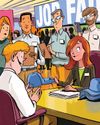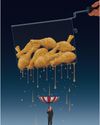
HUMBLE BEGINNINGS
Alakh Pandey's relationship with teaching started when he had to shift to a slum and live out of a rented house. He started giving tuitions to 4th standard students while being a 6th standard student himself. Pandey saved enough money to buy a cycle that he used to ride to other places for taking home tuition. Being an 11th-grade student, he went for a demo class in a coaching institute. The outcome of the demo class was not expected by anyone. The students at the end of the class were clapping for Alakh and his unique style of teaching.
Following these events, Pandey believed that he was on the right path and he had to take up teaching as his profession. Pandey taught for four years in brick and mortar coaching. The owner of the coaching witnessing his growth congratulated him and said that he would be teaching 5000-6000 students 10 years down the line.
However, Pandey wanted to expand his reach further and gradually came on YouTube with his will to reach more students in 2016. He posted full educational content for one year starting from 2016 itself and got a respectable 10,000 subscribers.
In January of 2018, a friend of his advised him to monetize his YouTube account and he received INR8000 and decided to leave the brick-and-mortar coaching to focus completely on YouTube in an attempt to reach more students.
He named the YouTube channel as PhysicsWallah. Pandey says the name is inspired by a famous tea stall called ChaiWallah, which has its presence in Kanpur, Lucknow and Varanasi. Pandey was with his sister in Kanpur when he came across the name. When his family enquired about his plans after dropping out of college, he replied with confidence, "I'll start PhysicsWallah". Pandey even started his Facebook page with the same name.
هذه القصة مأخوذة من طبعة Startups July 2022 من Entrepreneur magazine.
ابدأ النسخة التجريبية المجانية من Magzter GOLD لمدة 7 أيام للوصول إلى آلاف القصص المتميزة المنسقة وأكثر من 9,000 مجلة وصحيفة.
بالفعل مشترك ? تسجيل الدخول
هذه القصة مأخوذة من طبعة Startups July 2022 من Entrepreneur magazine.
ابدأ النسخة التجريبية المجانية من Magzter GOLD لمدة 7 أيام للوصول إلى آلاف القصص المتميزة المنسقة وأكثر من 9,000 مجلة وصحيفة.
بالفعل مشترك? تسجيل الدخول

Chords of Success
For Saahil Goel, the deep-rooted passion for playing the guitar dates back to his high school days. Influenced by legends like Pink Floyd, Led Zeppelin, and the Pakistani band Strings, his musical journey mirrors his leadership style-balancing focus, discipline, and a collaborative spirit. Goel feels that playing guitar has enhanced his ability to balance focus and teamwork as a founder of an eCommerce shipping start-up.

IS YOUR RENT TOO DAMN HIGH?
Many small business owners struggle with their rents. Here's what to do.

HOW TO BOUNCE BACK FROM A BAD REVIEW
A one-star review can hurt your ego - and your business. But it's possible to prevent (and remedy!) this scary scenario.

HOW TO HIRE FOR THE FUTURE
Small businesses are struggling to find quality labor. So flip the conversation: Show workers how your business will set them up for opportunity.

You Can Hire Like Netflix
The streaming platform built an incredible team with a strategy called “talent density.” But you don’t need to be a tech giant to do it.

Speedy Growth Killed My Startup
We seemed to be rocking it - lots of press, major partnerships. Then we learned the harsh consequences of overlooking our customers.

Three Pivots to $100 Million
How do you find a working business model? Do it like Rowan-a brand that reinvented itself many times before finally piercing the ear-piercing market.

What Goals Actually Matter?
Some benchmarks are more important than others so what should you really care about? We asked six founders for their hardest-won lessons.

'Only the Strongest Are Going to Survive'
Brian Lee cofounded companies like LegalZoom and ShoeDazzle-and he believes a lot of conventional business wisdom is backward. Sure, it's harder to raise capital. But it's actually cheaper than ever to start a company.

HOW TRUST SAVED KFC
The former CEO of Yum! Brands explains how he turned around a struggling KFC-and the important lesson it offers for anyone in franchising.